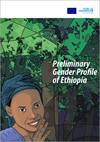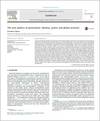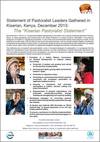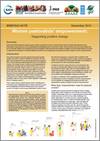Ethiopia is one of the 16 countries implementing the Global Financing for Gender Equality programme whose main objective is to increase the volume and effective use of aid and domestic resources to implement national commitments to gender equality and women’s empowerment (GE/WE). This Preliminary Gender Profile was undertaken to provide an indicative status of the level of gender equality in Ethiopia; propose recommendations on key gaps and emerging trends, and propose areas of focus for a comprehensive gender profile.
Year of publication: 2014Organization: Autores individuales
Topic: Género y juventud
Language: English
Type of document: Técnico
Geographical coverage: África Oriental
This article addresses the politics and practices of natural resource rights with a view to environmental justice. Struggles over identity politics at different geographical scales have become important mediators of claims for justice with respect to resource rights. Analyses of identity-based claims for environmental justice have usually focused on the indigenous peoples’ movement. This article focuses on the emerging global pastoralists’ movement. In recent years, mobile pastoralists have begun to carve out new global spaces, through which diverse groups have tried to negotiate common ground and forge common identities in their struggles for justice. They have become increasingly visible in nature conservation politics and in contests over land rights, claiming to be “custodians of the commons” in an era of global climatic change. The paper draws on empirical work amongst pastoralists, NGOs and activists from Kenya, Mongolia and Spain to explore these identities, their implications for resource rights, and the chains of accountability and legitimacy between global activists and local pastoralists.
Year of publication: 2013Organization: Autores individuales
Topic: Servicios ambientales
Language: English
Type of document: Técnico
Geographical coverage: Europa, África Oriental, Asia Central
Diciembre 9-15, 2013: 120 representantes de comunidades pastoriles de 48 países se dieron cita en Kiserian, Kenia, para compartir experiencias e inquietudes sobre la transición a una economía ecológica mundial. El pastoralismo –la producción ganadera extensiva en ecosistemas de pastizal– es uno de los sistemas alimentarios más respetuosos con el medio ambiente del mundo, pero la capacidad para proveer carne, leche y fibra, así como servicios ambientales, tales como la mitigación del cambio climático, la conservación de la biodiversidad y la protección de cuencas hidrográficas, se está erosionando continuamente debido a políticas e inversiones mal concebidas, a la inobservancia de los derechos humanos básicos, y a la interrupción de las prácticas adecuadas de gestión de pastizales, incluida la movilidad.
Year of publication: 2013Organization: Unión Internacional para la Conservación de la Naturaleza (IUCN), Programa de las Naciones Unidas para el Medio Ambiente (UNEP), Comisión Económica para África
Topic: Participación
Language: English, Français, Español
Type of document: Políticas y legislación
Geographical coverage: Global
This policy brief discusses how to best support women’s empowerment and gender equity. It concludes that interventions need to be start with pastoral women themselves. Empowerment is more sustainable when it comes from within. Women’s place and role in the pastoral communities needs to be understood and acknowledged. What empowerment means for pastoral women should influence how this is supported and achieved. The right institutional frameworks and supporting mechanisms are vital to support women’s empowerment.
Year of publication: 2013Organization: , Fondo Internacional de Desarrollo Agrícola (FIDA), Unión Internacional para la Conservación de la Naturaleza (IUCN), Programa de las Naciones Unidas para el Desarrollo (UNDP)
Topic: Género y juventud
Language: English
Type of document: Técnico, Políticas y legislación
Geographical coverage: Global
The real measure of success in the work that FAO does, is how effectively they help the most needy to live free of hunger, in better health and with stronger livelihoods. In 2013, FAO worked in north-eastern Uganda to explore how the concept of One Health can be implemented at the community level. This video highlights the work that the FAO team together with villagers, district health, agriculture and wildlife officials, and national decision-makers did to improve delivery of health services for pastoralists and their livestock. They identified brucellosis, a bacterial disease causing human suffering and livestock production losses, and took steps to assist in preventing this disease. Most importantly, the video shows how One Health teams can listen carefully to community members, both in setting health priorities and determining the best ways to help the community to improve their lives and livelihoods.
Year of publication: 2013Organization: Organización de las Naciones Unidas para la Alimentación y la Agricultura (FAO)
Topic: Seguridad alimentaria, Sanidad, Resiliencia
Language: English
Type of document: Videos
Geographical coverage: África Oriental
This report highlights the importance of pastoralist livestock mobility for the resilience of pastoralist livelihood systems and for maximising productivity. Tufts and partners monitored camel, sheep and cattle herds for up to five months in Darfur and Kordofan regions of Sudan. Using mixed methods and GPS tracking the study recorded in detail herd movements and management strategies in response to environmental parameters (the advancing rains and greening up of vegetation). The study highlights a diverse range of modernising trends and livelihood adaptations, including for example diversified investment strategies, herder responses to inter-tribal conflict in East Darfur and conflict avoidance strategies. Local case-studies present new evidence of a distinctive pastoralist approach to natural resource management that regulates access to natural resources rather than seeking to control numbers of animals. Not all trends are positive, and thus need to be analysed so as to support the positive while mitigating potential negative consequences.
A Policy Brief of the report can be found here.
Year of publication: 2013Organization:
Topic: Conflicto, Economía, Servicios ambientales, Seguridad alimentaria
Language: English
Type of document: Políticas y legislación
Geographical coverage: África Oriental
The representatives of the governments of the six countries of the Sahel (Burkina Faso, Chad, Mali, Mauritania, Niger, and Senegal) gathered in Nouakchott by invitation of the Government of the Islamic Republic of Mauritania, the Permanent Interstate Committee for Drought Control in the Sahel (CILSS), and the World Bank in collaboration with the African Union Commission, the Economic Community of West African States (ECOWAS), the West African Economic and Monetary Union (WAEMU), and the United Nations Food and Agriculture Organization (FAO) and in the presence of representatives of international and regional research organizations, civil society organizations, producers' organizations, the private sector, and technical and financial partners, for the purpose of strengthening the resilience of Sahelo-Saharan pastoral societies.
Year of publication: 2013Organization: Autores individuales
Topic: Participación
Language: English
Type of document: Políticas y legislación
Geographical coverage: África Occidental, África Central
This study gives an in–depth understanding of child labour in selected pastoralist communities in South Sudan. This information can be used to formulate and/or revise public policies and programmes on education and child labour elimination.
Year of publication: 2013Organization: Organización Internacional del Trabajo
Topic: Género y juventud
Language: English
Type of document: Técnico
Geographical coverage: África Oriental









